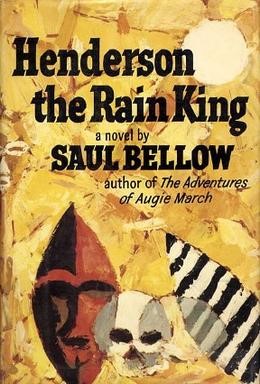As a film and literature enthusiast, I am always on the look out for stories that evoke the Dharma. Today, I have a gander at “Henderson the Rain King,” the 1959 novel by Canadian-American writer Saul Bellow.
This farcical adventure is the story of a millionaire in his fifties whose inner voice says I want, incessantly “raving,” “demanding,” and “desiring.” Leaving behind America and the capitalistic environment that has favored him so, as well as his second wife and their children, Henderson ventures into the depths of Africa where he discovers that Being as a way of life far exceeds Becoming.
Henderson is a larger than life personality who wears his heart on his sleeve and who is prone to getting carried away by his own (and often misplaced) enthusiasm and despair. While he attempts to set himself apart and make a difference to the native people he comes across, he only leaves destruction in his path. In a hilarious and heart wrenching passage, he promises the Arnewi tribe that he will save them from drought by clearing out the frogs that have invaded their water supply—only to accidentally blow the whole thing up, rendering it permanently unusable.

While Henderson is initially depressed about the devastating impact of his actions, he ventures to another community where (against the advice of his loyal and long-suffering guide Romilayu) he tries for a second time to make a formidable impression. Yet no matter how much he attempts to adopt the attitude of the locals, Henderson continues to dream of a different self and he remains a victim of his own swinging moods; that is, he continues to Become and he continues to suffer.
Addressing King Dafhu of the Wahiri, an educated and extravagant character that Henderson fears and simultaneously admires deeply, he laments: “King, I am a Becomer. Now you see your situation is different. You are a Be-er. I’ve just got to stop Becoming. Jesus Christ, when am I going to be?”
According to the author himself, out of all his fictional characters Henderson is the one that he resembles the most. Both Bellow and his protagonist share a tendency to deliberate in their own suffering, with Henderson admitting that he is “monstrously proud” of his suffering and that it is unlikely anyone else suffers in the same way. While the author found some solace in writing, Henderson is prescribed a mysterious cure by King Dafhu: to join him in the kingdom’s dungeons, and learn the art of Being from the “unavoidable” and terrific creature whose roars send shockwaves through the kingdom.


